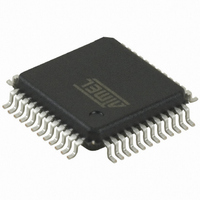AT32UC3B164-AUT Atmel, AT32UC3B164-AUT Datasheet - Page 390

AT32UC3B164-AUT
Manufacturer Part Number
AT32UC3B164-AUT
Description
IC MCU AVR32 64KB FLASH 48-TQFP
Manufacturer
Atmel
Series
AVR®32 UC3r
Specifications of AT32UC3B164-AUT
Core Processor
AVR
Core Size
32-Bit
Speed
60MHz
Connectivity
I²C, IrDA, SPI, SSC, UART/USART, USB
Peripherals
Brown-out Detect/Reset, DMA, POR, PWM, WDT
Number Of I /o
28
Program Memory Size
64KB (64K x 8)
Program Memory Type
FLASH
Ram Size
16K x 8
Voltage - Supply (vcc/vdd)
1.65 V ~ 1.95 V
Data Converters
A/D 6x10b
Oscillator Type
Internal
Operating Temperature
-40°C ~ 85°C
Package / Case
48-TQFP, 48-VQFP
Controller Family/series
AT32UC3B
No. Of I/o's
28
Ram Memory Size
16KB
Cpu Speed
60MHz
No. Of Timers
1
Rohs Compliant
Yes
For Use With
ATSTK600-TQFP48 - STK600 SOCKET/ADAPTER 48-TQFPATAVRONEKIT - KIT AVR/AVR32 DEBUGGER/PROGRMMR770-1008 - ISP 4PORT ATMEL AVR32 MCU SPIATEVK1101 - KIT DEV/EVAL FOR AVR32 AT32UC3B
Lead Free Status / RoHS Status
Lead free / RoHS Compliant
Eeprom Size
-
Available stocks
Company
Part Number
Manufacturer
Quantity
Price
- Current page: 390 of 676
- Download datasheet (11Mb)
22.7.2.14
22.7.2.15
22.7.2.16
22.7.2.17
32059I–06/2010
Underflow
Overflow
CRC error
Interrupts
• The user can read the byte count of the current bank from BYCT to know how many bytes to
• The user reads the data from the current bank by using the USBFIFOnDATA register, until all
• The user frees the bank and switches to the next bank (if any) by clearing FIFOCON.
If the endpoint uses several banks, the current one can be read while the following one is being
written by the host. Then, when the user clears FIFOCON, the following bank may already be
ready and RXOUTI is set immediately.
This error exists only for isochronous IN/OUT endpoints. It set the Underflow Interrupt
(UNDERFI) bit in UESTAn, what triggers an EPnINT interrupt if the Underflow Interrupt Enable
(UNDERFE) bit is one.
An underflow can occur during IN stage if the host attempts to read from an empty bank. A zero-
length packet is then automatically sent by the USBB.
An underflow can not occur during OUT stage on a CPU action, since the user may read only if
the bank is not empty (RXOUTI is one or RWALL is one).
An underflow can also occur during OUT stage if the host sends a packet while the bank is
already full. Typically, the CPU is not fast enough. The packet is lost.
An underflow can not occur during IN stage on a CPU action, since the user may write only if the
bank is not full (TXINI is one or RWALL is one).
This error exists for all endpoint types. It set the Overflow interrupt (OVERFI) bit in UESTAn,
what triggers an EPnINT interrupt if the Overflow Interrupt Enable (OVERFE) bit is one.
An overflow can occur during OUT stage if the host attempts to write into a bank that is too small
for the packet. The packet is acknowledged and the RXOUTI bit is set as if no overflow had
occurred. The bank is filled with all the first bytes of the packet that fit in.
An overflow can not occur during IN stage on a CPU action, since the user may write only if the
bank is not full (TXINI is one or RWALL is one).
This error exists only for isochronous OUT endpoints. It set the CRC Error Interrupt (CRCERRI)
bit in UESTAn, what triggers an EPnINT interrupt if the CRC Error Interrupt Enable (CRCERRE)
bit is one.
A CRC error can occur during OUT stage if the USBB detects a corrupted received packet. The
OUT packet is stored in the bank as if no CRC error had occurred (RXOUTI is set).
See the structure of the USB device interrupt system on
There are two kinds of device interrupts: processing, i.e. their generation is part of the normal
processing, and exception, i.e. errors (not related to CPU exceptions).
read, rather than polling RWALL.
the expected data frame is read or the bank is empty (in which case RWALL is cleared and
BYCT reaches zero).
Figure 22-6 on page
AT32UC3B
374.
390
Related parts for AT32UC3B164-AUT
Image
Part Number
Description
Manufacturer
Datasheet
Request
R

Part Number:
Description:
DEV KIT FOR AVR/AVR32
Manufacturer:
Atmel
Datasheet:

Part Number:
Description:
INTERVAL AND WIPE/WASH WIPER CONTROL IC WITH DELAY
Manufacturer:
ATMEL Corporation
Datasheet:

Part Number:
Description:
Low-Voltage Voice-Switched IC for Hands-Free Operation
Manufacturer:
ATMEL Corporation
Datasheet:

Part Number:
Description:
MONOLITHIC INTEGRATED FEATUREPHONE CIRCUIT
Manufacturer:
ATMEL Corporation
Datasheet:

Part Number:
Description:
AM-FM Receiver IC U4255BM-M
Manufacturer:
ATMEL Corporation
Datasheet:

Part Number:
Description:
Monolithic Integrated Feature Phone Circuit
Manufacturer:
ATMEL Corporation
Datasheet:

Part Number:
Description:
Multistandard Video-IF and Quasi Parallel Sound Processing
Manufacturer:
ATMEL Corporation
Datasheet:

Part Number:
Description:
High-performance EE PLD
Manufacturer:
ATMEL Corporation
Datasheet:

Part Number:
Description:
8-bit Flash Microcontroller
Manufacturer:
ATMEL Corporation
Datasheet:

Part Number:
Description:
2-Wire Serial EEPROM
Manufacturer:
ATMEL Corporation
Datasheet:











